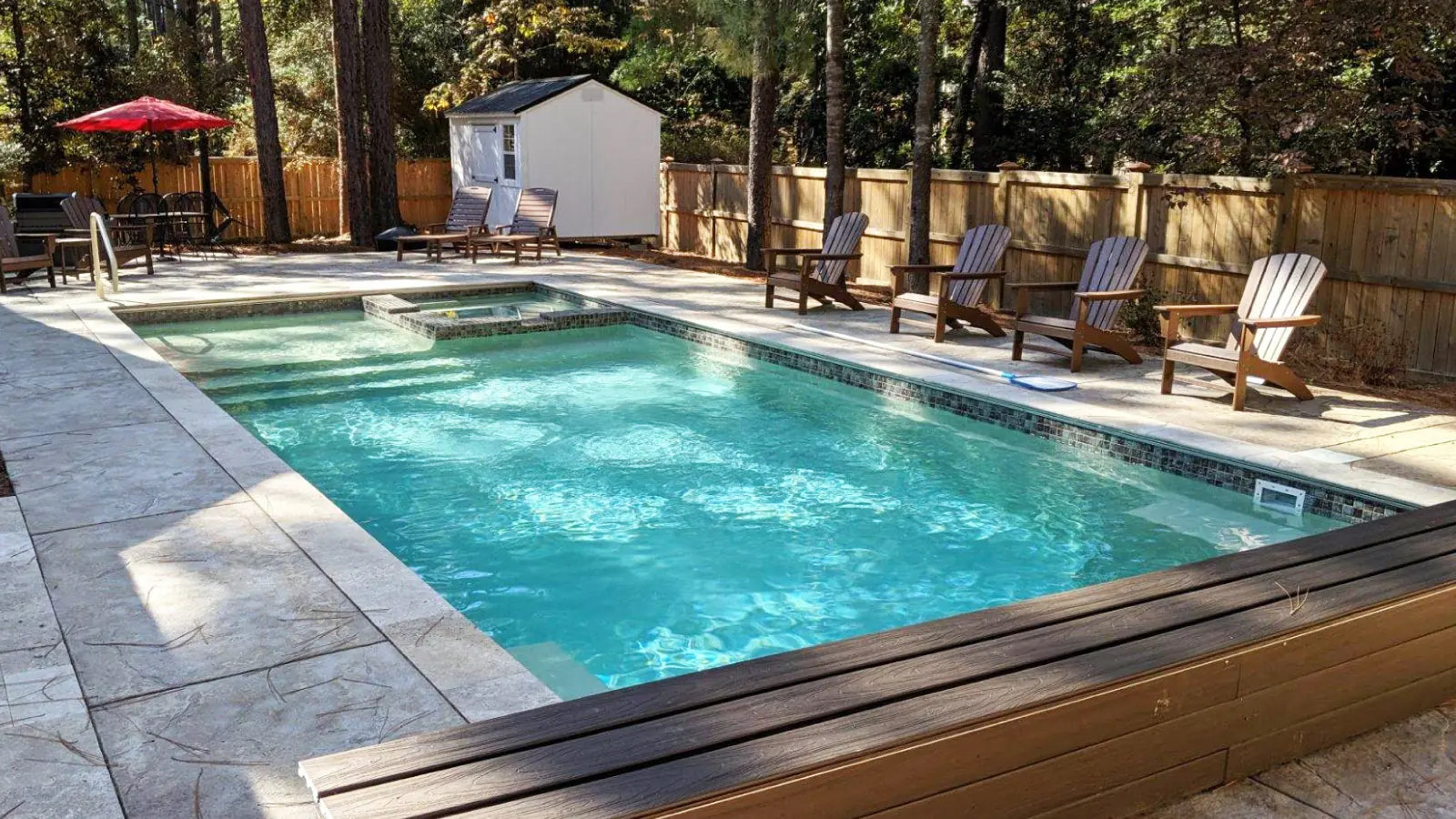
Pool Maintenance Made Easy
Introduction
Imagine stepping into your backyard on a sweltering summer afternoon and diving into a perfectly clear, refreshing pool. No cloudy water, no floating leaves—just pure relaxation. Maintaining that pristine pool might seem like a daunting task, but with the right approach, it’s easier than you think.
Many homeowners assume that pool maintenance requires constant work, but by following a simple routine, you can keep your pool clean, safe, and inviting with minimal effort. Whether you own a fiberglass, concrete, or vinyl-lined pool, this guide will walk you through the essential steps to maintain your backyard oasis year-round.
Why Fiberglass Pools Are Low Maintenance
If you’re considering a pool or already own a fiberglass pool, you’re in luck—these pools are among the easiest to maintain.
- Non-porous surface: Unlike concrete pools, fiberglass pools resist algae growth, reducing the need for frequent scrubbing.
- Lower chemical usage: Because algae struggle to thrive, fiberglass pools require fewer sanitizing chemicals, saving you money and effort.
- Minimal upkeep: Less frequent brushing and vacuuming mean lower maintenance costs and time investment.
- Durability: Fiberglass pools are resistant to cracks and structural damage, making them a long-lasting option.
Owning a fiberglass pool means you’ll spend less time on upkeep and more time enjoying your backyard retreat.
Daily Pool Maintenance Tips
A few simple daily tasks can keep your pool in top condition and prevent larger issues down the road.
- Skim debris: Use a skimmer net to remove leaves, bugs, and other debris before they sink to the bottom.
- Check water levels: Ensure the water is at the right level to prevent strain on the pump and filtration system.
- Monitor the pump and filter: Keep an eye on your pool’s circulation system to make sure everything is running efficiently.
- Inspect the pool area: Clear away dirt, leaves, and other debris near the pool to minimize contamination.
By incorporating these quick tasks into your daily routine, you’ll maintain a consistently clean and inviting pool.
Weekly Pool Maintenance
A weekly routine helps keep your pool water balanced and prevents long-term issues.
- Test water chemistry: Use a water testing kit to check pH, chlorine, and alkalinity levels, adjusting as needed.
- Brush the walls and floor: Prevent algae buildup by scrubbing the pool’s surfaces.
- Vacuum the pool: Remove dirt and debris that settle at the bottom.
- Empty skimmer and pump baskets: Keeping these clean ensures proper water circulation and filtration.
Consistently following these steps will reduce the risk of algae growth and keep your pool water sparkling clear.
Monthly Pool Maintenance
A deeper clean once a month helps maintain the long-term health of your pool.
- Shock the pool: Adding a pool shock treatment eliminates bacteria, algae, and contaminants.
- Inspect pool equipment: Check filters, pumps, and heaters for signs of wear and tear.
- Deep clean tiles and grout: Prevent staining and buildup by scrubbing tile surfaces.
- Check for leaks or cracks: Address any structural issues before they become major problems.
Regular monthly maintenance ensures that your pool remains in excellent condition throughout the year.
Seasonal Pool Care
Each season brings unique challenges, and adjusting your maintenance routine accordingly will help keep your pool in peak condition.
Spring
- Remove and clean the pool cover.
- Balance water chemistry before opening for the season.
- Inspect for any damage caused by winter weather.
Summer
- Increase filtration and skimming due to higher usage.
- Monitor water levels frequently to counteract evaporation.
- Maintain proper chlorine and pH levels to prevent cloudy water.
Fall
- Skim leaves regularly to prevent clogging.
- Reduce pump run times as temperatures cool.
- Consider using a pool cover to minimize debris.
Winter
- If closing the pool, winterize it properly.
- Lower water levels and add winterizing chemicals.
- Drain excess water from plumbing to prevent freezing.
By adjusting your pool maintenance routine with the seasons, you can prevent costly repairs and extend the life of your pool.
Troubleshooting Common Pool Problems
Even with regular maintenance, pool issues can arise. Here’s how to fix some of the most common problems:
- Cloudy water: Test and adjust chemical levels, clean the filter, and remove excess debris.
- Algae growth: Shock the pool, brush affected areas, and maintain proper chlorine levels.
- Stains on surfaces: Identify the stain type (organic, metal, or mineral) and use the appropriate stain remover.
- Pump or filter issues: Check for clogs, ensure proper water flow, and clean or replace filters as needed.
Addressing these issues early can prevent them from turning into bigger, more expensive problems.
Tools for Easy Maintenance
The right tools can make swimming pool maintenance effortless:
- Robotic pool cleaners: Automate vacuuming and scrubbing.
- Water testing kits: Ensure accurate chemical balance.
- Telescopic skimmers and brushes: Make cleaning more convenient.
- Pool covers: Minimize debris and reduce evaporation.
Investing in these tools can significantly cut down on maintenance time and effort.
Energy-Efficient Maintenance
Keeping your pool clean doesn’t have to be costly. Try these energy-saving strategies:
- Use variable-speed pumps: These pumps adjust their speed to optimize energy use and reduce electricity consumption.
- Install a solar cover: Helps retain heat and reduces the need for additional heating.
- Optimize filtration schedules: Run the pump during off-peak hours to lower energy costs.
- Switch to LED pool lights: These lights use less energy and last longer than traditional bulbs.
By implementing these energy-efficient tips, you can enjoy a clean pool while saving money on utilities.
Professional Maintenance Services
Sometimes, professional help is the best solution for keeping your pool in top shape.
When to Call an Expert
- Persistent water chemistry imbalances.
- Malfunctioning pumps, filters, or heaters.
- Structural damage, leaks, or other major issues.
What Professional Services Offer
- Regular deep cleaning and equipment inspections.
- Seasonal opening and closing assistance.
- Repairs and maintenance for pumps, filters, and heaters.
If you need expert assistance, consider scheduling professional pool maintenance services to keep your pool in perfect condition.
Maintaining Pool Surroundings
A clean pool area enhances safety and aesthetics.
- Sweep and hose down the pool deck regularly.
- Trim nearby trees and bushes to reduce falling debris.
- Ensure proper drainage to prevent puddles and slippery surfaces.
- Store chemicals safely to avoid contamination and accidents.
By maintaining the area around your pool, you create a safer and more enjoyable environment for swimming.
Conclusion
Owning a pool should be a source of relaxation, not stress. By following a consistent pool maintenance routine, you can keep your pool clean, safe, and beautiful with minimal effort. Whether you prefer to handle maintenance yourself or enlist professional help, a well-maintained pool ensures years of enjoyment.
For expert advice and professional pool maintenance services, contact the experts at All Amercian Pools today.

